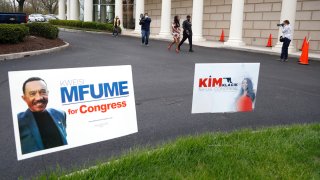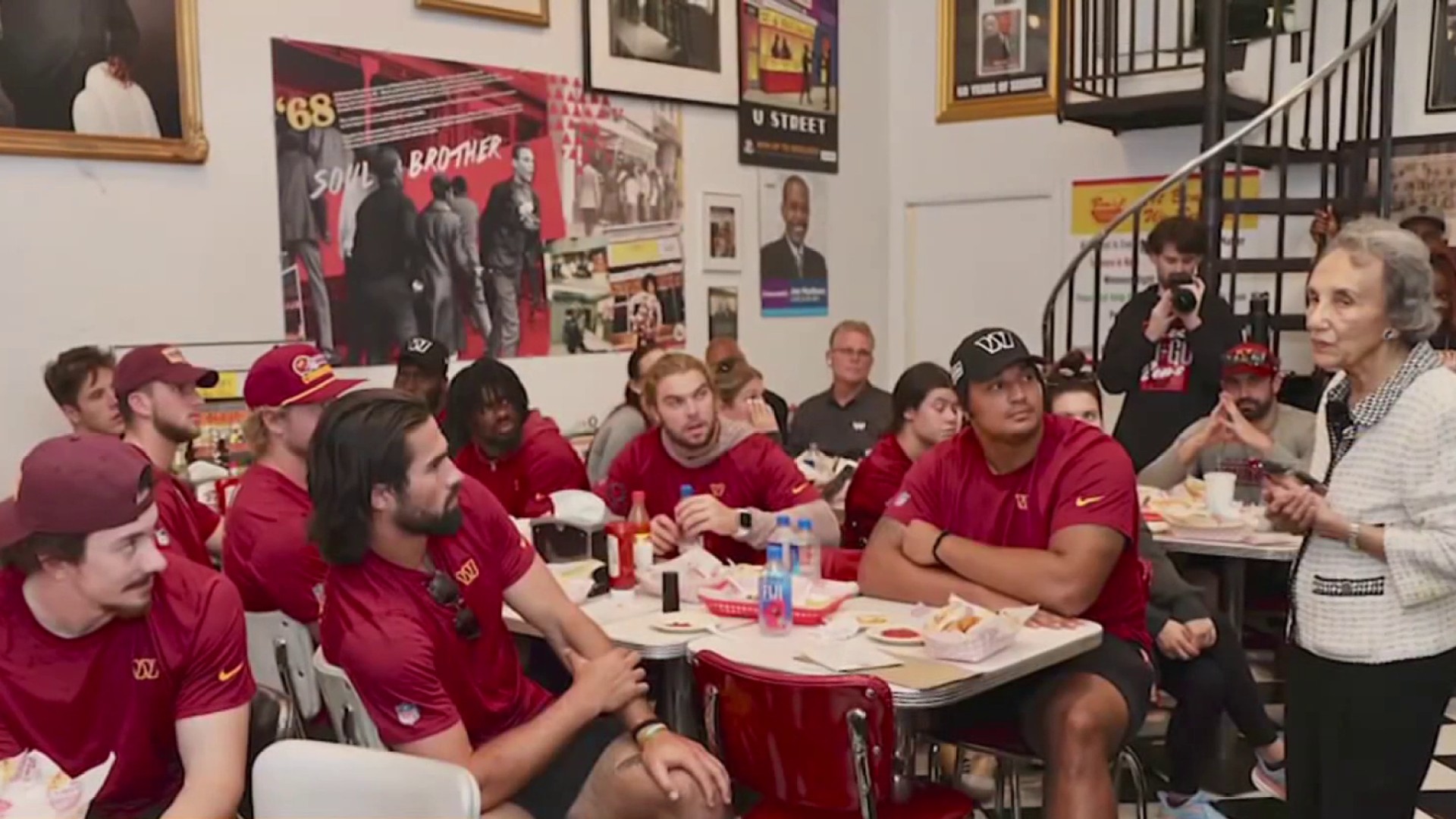
Kimberly Klacik, top center, the Republican candidate in the 7th Congressional District special election, walks with her security detail as she visits campaign supporters outside of a voting center, Tuesday, April 28, 2020, in Windsor Mill, Md. Klacik is going up against Democrat Kweisi Mfume in the election to fill a seat left open by the death last October of Congressman Elijah Cummings. An election that has been dramatically reshaped by the coronavirus outbreak.
Republican Kimberly Klacik isn’t just criticizing her opponent, Rep. Kweisi Mfume, in a Maryland congressional race in a heavily Democratic district: She’s blaming Democrats for more than five decades of difficulties in Baltimore and other cities that have been troubled by high levels of crime and poverty while led by Democrats.
Klacik drew President Donald Trump’s attention in August with an ad on Twitter, which shows her walking by a blighted section of Baltimore criticizing Democrats for hurting Maryland’s largest city. The result: a coveted speaking role at the Republican National Convention.
“The Trump family saw it. They loved it,” she said in an interview. “I run into people all the time who say, ‘What you said was spot on.’”
Her ads and the president’s support have generated more than just buzz. Klacik now holds a huge fundraising advantage over the former NAACP leader. She raised nearly $6.5 million from July 1 to Sept. 30, and she has about $3.6 million cash on hand. That compares to Mfume raising about $184,000 in the same period. He has about $269,000 cash on hand, according to Federal Election Commission filings this week.
While Klacik lost an April special election, she says she’s now better positioned in her second race against Mfume, who received about 74% of the vote to fill the House vacancy created by the death of Elijah Cummings. Mfume also held the seat before Cummings.
Mfume notes much of the money Klacik has raised came from out of state, while he's better known in the majority-minority district.
“She believes that she can buy the district, and I’m going to show her that Baltimore and the 7th Congressional District is not for sale — to her or to Donald Trump — no matter how much money they throw into it,” Mfume said.
Local
Washington, D.C., Maryland and Virginia local news, events and information
Klacik’s profile started to rise last year, after she spoke on Fox News about her social media posts showing trash in Baltimore. Trump then tweeted the district is a “disgusting, rat and rodent infested mess” where “no human being would want to live.” The tweets directed at the district of Cummings, who was leading investigations into the president at the time, made national headlines.
Klacik raised her profile further with her recent ads on Twitter. In the first, she walks by dilapidated buildings in Baltimore and asks: “Do you care about Black lives? The people that run Baltimore don’t.”
“It’s not just Baltimore. The worst place for a Black person to live in America is a Democrat-controlled city,” she says in the ad, “and Black people don’t have to vote Democrat.”
Trump underscored the message on Twitter.
“Kimberly will work with the Trump Administration and we will bring Baltimore back, and fast,” the president tweeted in August. “Don’t blow it Baltimore, the Democrats have destroyed your city!”
But Mfume says he hasn’t heard how Klacik plans to improve the city. He says the president’s support for her is part of a larger strategy to try to gain support from Black voters. Mfume describes her as “the darling of the Trumpers within the party,” who are happy to see a Black woman criticizing Democrats in a campaign. Yet Mfume is quick to point out Klacik doesn’t even live in the district.
“This is really the old snake oil salesman approach, you know: ‘I’ve got the cure for everything. It’s in this bottle. Just drink it and trust me.’ And that’s what he has brought to the American public, and that’s what she has brought to the voters of the 7th Congressional District. But the voters here are much smarter than Kim Klacik in that regard,” Mfume said.
Democrats hold a 2-1 advantage over Republicans statewide in Maryland. Democrats have a 7-1 advantage in Maryland’s eight U.S. House seats.
Some political observers express doubt about Klacik’s ads resonating with Black voters, especially against a prominent Black leader like Mfume in a district that includes a large swath of Baltimore’s inner city as well as the suburbs.
Chryl Laird, a professor of government and legal studies at Bowdoin College in Maine who is the coauthor of “Steadfast Democrats: How Social Forces Shape Black Political Behavior,” said while she thinks the president believes he can gain support from Black voters, this isn’t a winning approach.
Laird said she would feel insulted by the ads if she lived in the district because they send the message that Black voters have been misguided — and that difficult circumstances they are living with are the result of their continued support for Democrats, rather than conditions caused by systemic racism.
“I think Trump likes the visual that there is a Black woman that is willing to openly come out and essentially call out Black people for what she sees — and what he sees — as this problematic practice of their politics of collectively getting behind the Democratic Party,” Laird said.



